Conquering Hormones with Vegan Nutritionist and PMS Punisher Sara Galipeau

I first met Sara Galipeau at a vegan business owners meet-up here in Ottawa last year. She was very sweet and very soft-spoken (the total and complete opposite of me) :)
And I could tell that she really knew her shit when it came to vegan health and nutrition. She has, after all, been surviving on plants since 1999 and working as an advanced RHN since 2012! Yes, that means you can actually get her holistic coaching covered by your medical insurance! SCORE! ;)
Well, as most vegan meet-ups go, we took our newfound friendship to instagram. And it was here that I discovered Sara is also quite the little expert on all things reproductive and hormone health - something I had become more and more interested in since hitting the big 3-0.
Obviously a JOTB interview with Sara was imperative! Not only are hormonal imbalances something that I address with my own vegan clients ALL the time-- hormones DO, after all, play a HUGE role in fat loss and metabolic health. But on a completely selfish level, my PMS symptoms after 30 had literally went from a "two" to a solid "seven" on the bloated, emotional, give-me-all-the-chocolate scale.
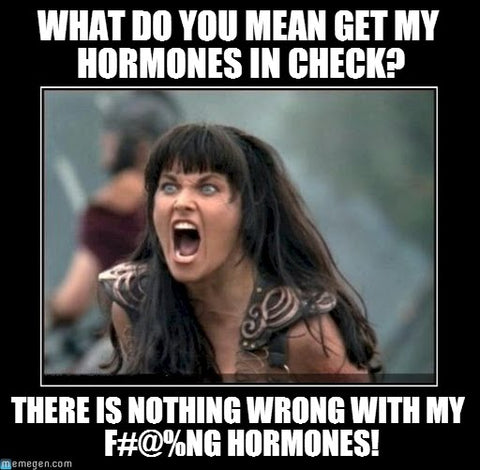
So because this was SUCH a common topic amongst SOOO many of us PMS and menopause sufferin' ladies, I decided to put aside my podcast microphone for a quick minute and dust off the ol' website and give you guys a good ol' fashioned blog post interview!
Well, truthfully, I just wanted to give you (and me) some easily accessible hormone health literary gold that you could print/copy/paste/reference at your convenience. You're welcome!
Alright enough backstory already! Let's get to my interview on regulating hormones with registered vegan holistic nutritionist and reproductive health expert Sara Galipeau!

What made you specialize in this “hormone” area in the first place?
“I’ve struggled with issues related to hormone balance pretty much my whole life, starting with being one of the first girls in my class to grow breasts and wear a bra at 9 years old; dealing with acne, migraines, and excess sweating in my teens. Right up into adulthood with having a cyst surgically removed from my ovary, and compensating for the hormonal fallout of going off of birth control pills. It’s been a ride, and I want to give other women the tools to alleviate their hormonal pain as much as I can.”
How can nutrition play an important role in having balanced hormones and minimal PMS/menopause issues?
“Being aware of what foods affect your hormones and how to integrate the right ones and avoid the wrong ones can make all the difference, whether it’s having a cycle that surprises you with how painless (and drama-free) it is at onset, or sleeping through several nights in a row without throwing off all the blankets. Recognizing that some types of foods will work for some people but not others is a large component as well. For example, some women have excellent results including soy products, while others need to avoid them altogether.”
Why do you believe the vegan diet is optimal for hormone health?
“Whether someone chooses vegan for animals (as I did) or for health first, it actually comes back to animal agriculture either way. Where industrial livestock is largely fed genetically modified crops that are also heavily treated with chemicals that have been found to be hormone disruptors at even “low” concentrations. Animals may also be treated with hormones to speed up and increase total growth for meat and production of milk. By avoiding animal products, we cut down our consumption of these hormone disruptors as well, so opting to eat more plants instead is a great place to start.”
Research shows that we’re a high estrogen society because of all the xeno-estrogens we’re exposed to via the products we use, food we eat and environment we breathe. But what does “estrogen dominance” entail for our female bodies and hormones?
“Estrogen dominance occurs when the ratio between estrogen and progesterone levels becomes too far apart, leaving estrogen to “dominate.” Estrogen contributes to such symptoms as swollen and cystic breasts, mood swings, irregular and heavy bleeding, and polycystic ovaries. In young girls it can also contribute to early breast growth and the onset of periods. High estrogen may also be linked to development of certain types of cancer of the breast, ovaries, and cervix. Choosing more foods like cruciferous vegetables and flax seeds can be a great step toward helping the body process and expel excess estrogens.”
For years, I’ve recommended DIM to my clients for helping to decrease their estrogen to help them lose weight. But I also find it’s good for PMS. Are you familiar with it at all and is this something you’ve seen any luck with?
“DIM is an antioxidant found in cruciferous vegetables that may help support the liver in processing estrogen, so it’s a great addition to an estrogen dominance protocol. In my post-surgery and post-birth-control journey, and based on my knowledge, I used a supplemental combination that included DIM (diindolylmethane), its mother I3C (indole-3-carbinol) and a few other herbs like chasteberry and turmeric to help keep my hormones in check. I saw great results when it came to balancing my period and PMS, and have recommended the combo ever since. To date, clients who have used it consistently have also reported easier periods.”
Who knew turmeric was also good for hormone health?! That's awesome news because I already add it to my daily smoothies. As for DIM, I typically recommend that my clients take one serving (100 - 150 mg) once or twice daily. I really love EstroAdapt by Aor. It contains a healthy dose of DIM plus a bunch of other good stuff like hops (to reduce abnormal cell growth in breast tissue) and D-glucarate, choline and SGS which help your body to remove excess hormones.
And while we're on the topic, how does estrogen dominance affect fat loss/fat storage anyway?
“High estrogen tends to lead to storage of fat around the hips and thighs, whereas high-estrogen women reaching menopause tend to store more around the belly – which is known to contribute to increased health risks. The liver also has to process excess estrogens contributing to its overall load. Excess estrogens may also be stored as fat.”
I’ve also heard that having too low of progesterone can wreak havoc on us especially around our periods.
“It comes back to the overall ratio of estrogen and progesterone levels. Even if estrogen is in the “normal” range, but progesterone is too low, symptoms related to estrogen dominance can still occur, but in a different manner. Progesterone is supposed to rise after ovulation, keeping the uterine lining thick in the event of an embryo attaching. Low progesterone contributes to irregular light periods, may affect fertility, contribute to anxiety and low sex drive, and even affect thyroid function. It’s also this dip in progesterone combined with a disparate ratio to estrogen that can contribute to estrogen dominance into menopause as well.”
Why is my PMS sooooo much worse in my 30s than my 20s?
“There could be a few reasons for this, usually in combination.
1) As we reach deeper into our 30s and 40s, our hormone levels start to fluctuate more as we approach the end of our most fertile stage, the number of our ova has declined, and our menstrual life is coming closer to its end.
2) The accumulation of stress (such as from work and school, exposure to environmental contaminants, overexertion without proper recovery, poor sleep habits, excessive use of alcohol or stimulants, use of high-xenoestrogen home and beauty products, and of course poor-quality food) on the body affects the adrenal system, which also affects our sex hormones!
3) The accumulation of stress on the body also affects the liver and intestines, shifting microbiome balance, slowing the liver’s ability to process everything that comes its way as efficiently, and affecting how we absorb nutrients that otherwise contribute to the health of our hormones.”
For the last couple of years, I've been relieving my period cramps with an essential oil mixture that I rub all over my teets and pelvic area. It's a combo of Ylang-Ylang and Clary Sage oils mixed with evening primrose oil. It gives off quite the potent STANK but I do find it soothing as a body rub and calming when breathed in.
Are there any herbal/hippie remedies like this that you recommend to help combat PMS symptoms?
“Thankfully, yes! For acute symptoms like headaches and cramps, I love a combo of turmeric and ginger. I’ll either have a mug of golden mylk, ginger tea, or herbal chai tea, or I’ll take capsules. I’ve also been known to throw the spices into a smoothie for breakfast! I also like magnesium glycinate, especially before bed.
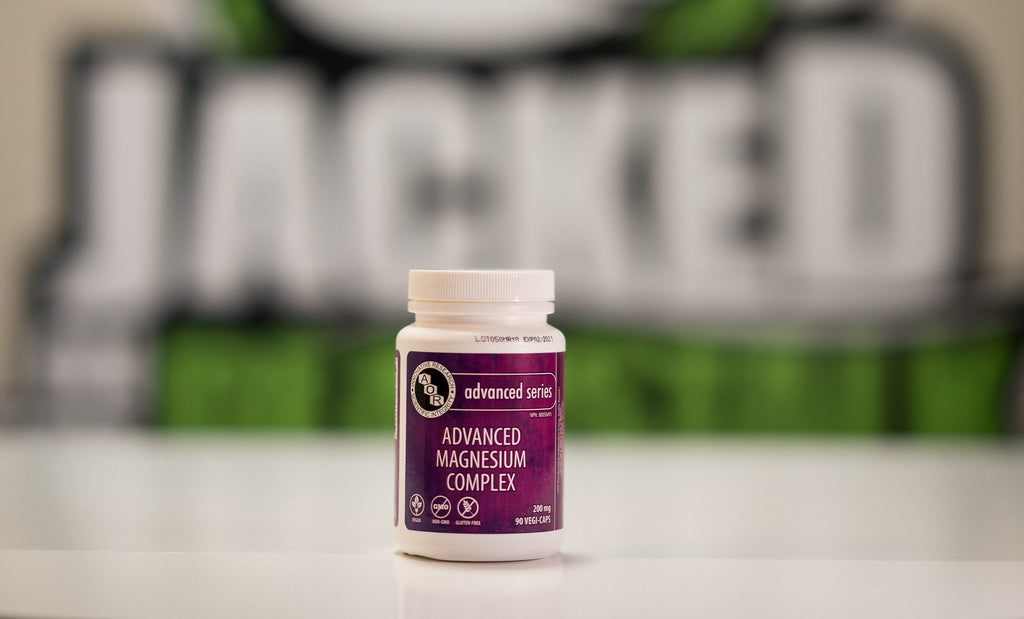
Nettle leaf is great for bloating and improving skin health, and can be taken as tea. I like to cold brew about a liter of it (with hibiscus and mint) and sip it at my desk through the day.
Reishi mushroom is fabulous for taming anxiety, stress, and inflammation, and can be taken in capsules, tincture, or powder.
For long-term alleviation and prevention, increasing cruciferous veggies (think broccoli, cauliflower, kale, bok choy), flax and chia seeds, legumes, and herbs and spices like basil, parsley, ginger, and turmeric can go a long way to keeping hormones in check throughout the cycle. Seed cycling throughout the month can also be helpful for maintaining a healthy balance of estrogen and progesterone at the right times, as certain seeds contain phytochemicals and omega fats that help stimulate and process hormones. So this means consuming 1 Tbsp. ground flax and/or pumpkin seeds daily for days 1-14 to keep estrogen humming, and switching to 1 Tbsp. sesame and/or sunflower seeds for days 15-28 for progesterone.”
How can adaptogenic herbs help to balance our hormones?
“Pretty simply, it’s right in the name! Adaptogenic herbs are called so because they help the body “adapt” as it needs to reach more normal parameters. A common thread with most is their function on stress hormones in particular. Keeping stress hormones in check keeps the adrenals nourished and happy, so that they can also perform the otherwise peripheral function of modulating sex hormones. Some of my favourites for hormone balance especially where sex hormones are concerned include maca, ashwagandha, ginseng, licorice, reishi, and turmeric.”
Yes! I too am a huge fan of both maca and ashwagandha root! I like adding maca powder to my morning smoothies for hormone regulation, a boost of energy AND because it kinda tastes like butterscotch! I'm also a big fan of FemCalm by AOR which contains both ashwagandha root AND chasteberry. I've heard that both are helpful in regulating your periods.
And speaking of disruptions, what are your thoughts on GMO soy being a hormone disruptor because it contains glyphosate?
“While soy itself is considered an estrogenic food due to its content of phytoestrogen, I believe it gets its “bad rap” due to the prevalence and coexistence of glyphosate, which is now a known hormone disruptor and carcinogen. I don’t believe in most cases that it’s necessary to completely avoid soy, but to make sure that what is consumed is organic and/or certified non-GMO, and fermented, such as tempeh or miso. Avoiding animal products as noted previously can also help reduce exposure to glyphosate. It’s also important to note that glyphosate is often used as a desiccant in some non-GMO crops, like wheat, so choosing organic grain products is important as well.”
Great answer! In fact, I love that you mentioned flax seed as a hormone helper because flax also gets a bad rap for its “estrogenic” properties. But as I always say, just because something is estrogenic doesn’t make it the enemy. But what most people don’t realize is that many skincare products contain parabens and phthalates which are estrogenic. The difference is that it’s a form of estrogen you should NEVER expose your body to because they're synthetic. These are the “xenoestrogens” we often hear about and yes, they've absolutely been linked to cancers and hormonal disruption. And of course, the average uninformed person then thinks that if flaxseed is estrogenic, it must be as evil as these synthetic estrogens found in our toxic beauty products. But NOOOOO!!! You cannot compare a plant-derived estrogen with a synthetically-derived estrogen!
Okay rant over. But while I’m all fired up, do you think that cortisol/stress levels have any effect on our hormones and more specifically PMS or menopause symptoms?
“When adrenals become overtaxed with production of cortisol, peripheral functions like the formation of sex hormones drops off, and we can start to see an increase in symptoms related to the imbalance of those hormones. Cortisol also contributes to storage of fat, which is of particular concern in menopause. With both low estrogen and low progesterone contributing to so many symptoms associated with PMS, keeping on top of cortisol helps us keep sex hormones flowing and in turn can help keep PMS and menopause symptoms in check. So if someone is experiencing symptoms like low sex drive, anxiety, and depression, especially in the days before a period, addressing cortisol primarily as well as working to improve sex hormone levels can be most beneficial.”
Are there any other vitamins or herbs you’d recommend to someone who’s REALLY struggling with hormonal imbalances?
"From my personal experience, I have seen success with these in myself, and professionally in my estrogen-dominant clients, with chasteberry as well as magnesium. Supplemental recommendations do vary condition-to-condition, person-to-person. My go-to products tend to include chasteberry, DIM/I3C, magnesium, B complex, omegas, probiotics, turmeric, ashwagandha, and maca, depending on the person’s particular symptoms and struggles.”
Oh yeah! I am ALL about a good quality B complex! The vegan diet is deficient in B12 so you MUST supplement with it or consume foods that are fortified with it. (I know we vegans all know that one!) But what a lot of peeps don’t know is that B vitamins are also crucial for regulating estrogen metabolism and providing mood and energy support! Definitely a PMSing girl's best friend (after chocolate of course...) But yeah, I’ve been consuming and recommending AOR's Advanced B Complex to my clients forever.
Just look how excited and happy I am about it! Seriously, it's the best!
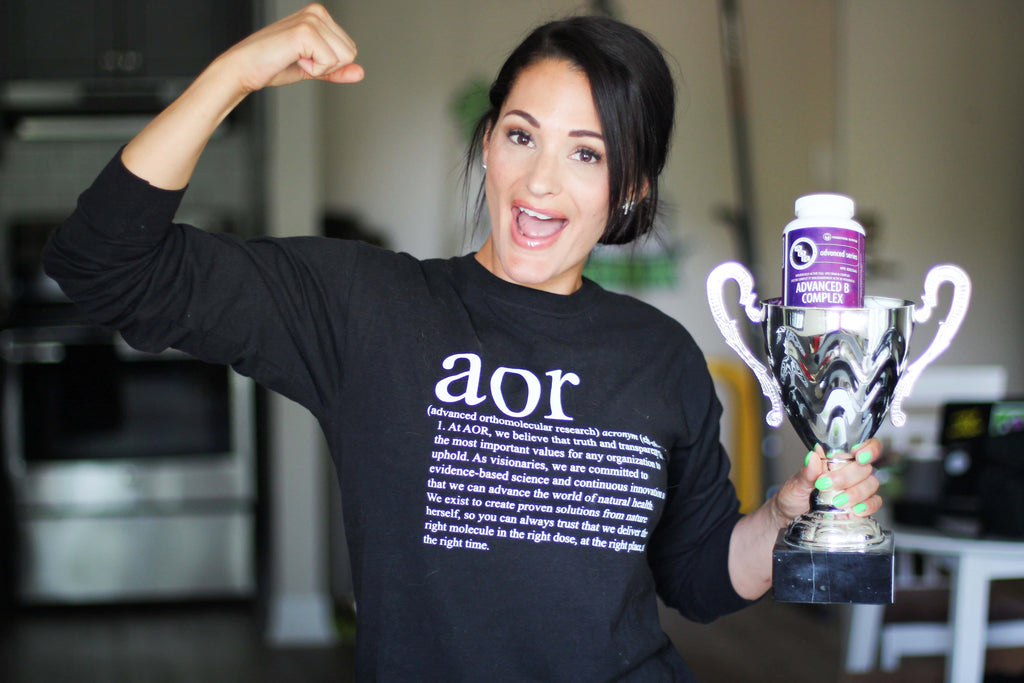
And YOU'RE the best Sara, for sharing your wealth of vegan hippie hormone knowledge with us! Thank you so much for this interview. Any final tips or suggestions for our PMS sufferers?
“I often recommend clients get blood work done too (either through their physician or naturopath) to detect or rule out other factors, such as iron or vitamin D deficiency, or a thyroid hormone imbalance. These can also be contributing to symptoms commonly associated with sex hormone imbalances. As we like to say, one symptom could stem from multiple possible causes.”
Great advice once again! And I hope you kids enjoyed this information-packed blog post interview as much as I did!
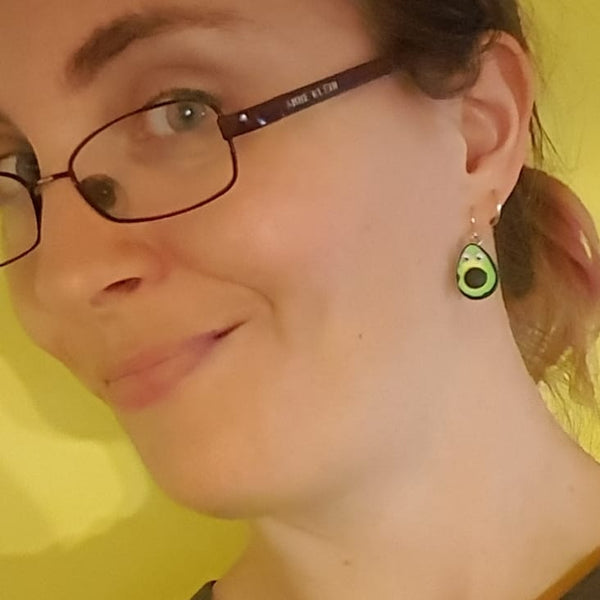
And her avocado earrings!
If you do, be sure to follow her on instagram at @sara_rhn_loveplants. You can also learn more about her work via her website at http://www.saragalipeau.ca. And I'm sure she'd be happy to answer any hormonal health questions you may have via e-mail at sararhn@loveplantsforlife.com.
I don't care what anyone says! PMS is REAL and it's a serious monthly struggle for many of us. And if you're like me and crave sweets the week before your period, next month try making my PMS relief dessert recommendation:
Prune Squares with Vanilla Tofu Pudding
They're tasty, symptom-relieving AND healthy! Sidenote: is anyone else getting REAL sick of reading my bold, italicized font yet? I know I sure am!
Until next time, kids! Happy periods!
Sam Shorkey, Jacked on the Beanstalk
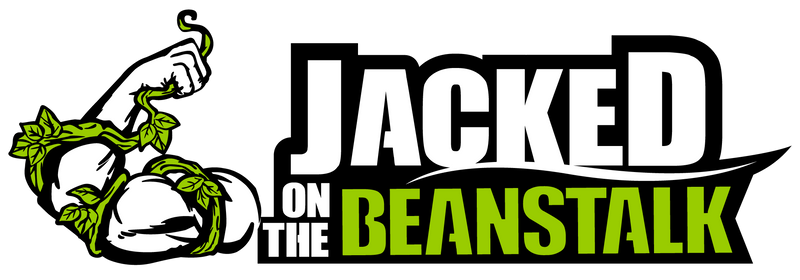
2 comments
Wow! Great interview packed with so much information. As someone who just switched to a WFPB diet and has TERRIBLE PMS, I’m excited to incorporate these suggestions and see how things progress. Thank you for sharing your knowledge.
I to, suffer from pms/hormone symptoms, n i need help